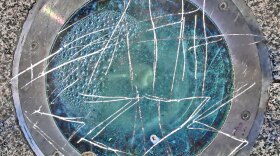Ross Birchard, better known as stage name Hudson Mohawke, didn’t want to make a “traditional" album. Lantern, his latest, is an exercise in genre attention-deficit; Mohawke gleefully switches instruments and sounds up for maximum inconsistency. However, once the lack of cohesion is acknowledged, it’s a very fun listen.
Mohawke has made music since 2005, but he really got popular with his 2009 Warp Records debut Butter, an 18-track sonic glitchfest. After a couple of EPs and solid remixes, Mohawke got, like, really, really popular with TNGHT, a duo he halved with Montreal DJ Lunice. The release of their self-titled in 2012 established the thunderous brass line as the gold standard for rap music. Essentially, these guys are the godfathers of the trap horn. Not to mention their use of pulsing synths, minimalistic percussion, and creative sampling—baby noises, glass shattering, water droplets—to create a truly amazing hybrid of cacophony and melody.
This hybrid still remains in Mohawke’s solo work, but to lesser effect. On Lantern, he’s circling a more beautiful sound. Collaborations with Miguel, JheneAiko, and Irfane reveal a more emotionally driven record. All of these are spread out, however, attributing to the aforementioned inconsistency. The Miguel-featuring track, “Deepspace,” is a vocally driven affair, underscored by spacy, reverb synths and tribal drums. The following track, “Shadows,” dives into the 8-bit realm, seemingly at random.
More examples continue with the wavy and beautiful “Indian Steps (ft. Anthony),” which is paired next to “Lil Djembe,” a curious song that sounds like Mohawke was hitting wine bottles with a spoon. “Ryderz,” an interpolation of D.J. Roger’s “Watch Out for the Riders,” is trap-soul epic that could survive in 1973 or 2015. However, it’s immediately followed by the bouncy, piano-driven “Warriors (ft. Ruckazoid & Devaeux),” where it’s syrupy vocals place it solely in the realm of modern pop.
Lantern’s best moment is the one-two punch of “Kettles” and “Scud Books.” The former is a cinematic affair, clarinets and glockenspiels dance into an epic brass buildup. This is also the first taste of the TNGHT horns that Mohawke helped popularize, only they’re confined to an orchestral setting. After a cymbal fadeout, the horns come back in for “Scud Books” an unabashedly trap banger, as grandiose as the orchestral “Kettles,” but with horns used in a completely different setting.
In its entirety, Lantern feels like a collection of short stories; each track fleshed out yet different from the next. In a certain sense, the inconsistencies takes away from the work as a whole, and compared to more “traditional” albums, Lantern stumbles. However, the common response to, “what’s your favorite type of music” is often “oh, a little bit of everything.” If this is true, then Mohawke made something for the music listener. Lantern is essententially a genre fiesta—an established producer illuminating new worlds of music as he sees fit.






